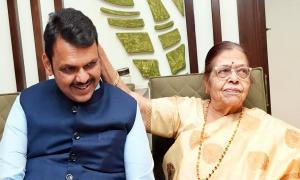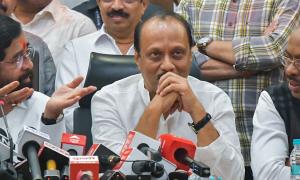Though Indians continue to be the most successful ethnic group in America, the community has problems of poverty, according to the US Census Bureau's American Community Survey.
The poverty rate for families nationally is 10.2 percent; for the Indian community it is 6.1 percent. That means 6.1 percent of Indian-American families now live below the poverty level. According to recent guidelines, a family of four earning less than $20,000 (about Rs 8.92 lakh) a year is considered as living in poverty.
Nationally the individual poverty rate is 13.3. For the Indians it is 8.4 percent. A person earning less than $9,800 (about Rs 4.32 lakh) a year is classified thus.
The per capita income for Indians is $33,431 (about Rs 15 lakh); nationally it is $25,035 (about Rs 11.65 lakh).
But the median household income for Indians is much higher than the national income at $73,575 (about Rs 32.81 lakh); nationally it is $46,242 (about Rs 20.62 lakh).
 Another finding of the American Community Survey is that the population of Indians and other South Asians grew faster in cities like New York and Washington, DC.
Another finding of the American Community Survey is that the population of Indians and other South Asians grew faster in cities like New York and Washington, DC.
On the national level, more than 600,000 Indians were added to the national population in the last five years, a growth rate with no precedent in the history of the immigration of Indians to the US.
From almost 16.7 lakh in 2000, the Indian population grew to 23 lakh in 2005, (margin of error: +/-41,272), the highest for any Asian country.
Nationally, the Chinese are still the number one Asian community with 28.82 lakh people. Indians now rank second, according to the American Community Survey, which was published last week.
The 2000 Census found the Indians the fastest growing Asian community with a 106 percent growth during the period 1990-2000. The Filipinos then ranked second in numbers after the Chinese. In five years Indians have pushed the Filipinos to third place.
Indians are most heavily concentrated in five states: California, New York, New Jersey, Texas and Illinois.
The top 5 cities with Indians are New York, San Francisco-Oakland-San Jose, Chicago, Los Angeles and Washington, DC.
Other findings: 27.5 percent of the Indians entered the US after 2000. 38.5 percent entered the US between 1990 and 1999. 33.9 percent arrived before 1990.
Among the Indians, native born number 5.88 lakh. 68.2 percent of Indians are employed; nationally it is 65.9 percent. 89.4 percent of Indians have one or more vehicle; nationally it is 91.1 percent.
Though the census is conducted only once in ten years the Census Bureau conducts the annual survey which benchmarks key population statistics. The Survey only counts the number of people living in households excluding the population living in institutions, colleges and other group quarters. The Indian population would be higher than the current count if the numbers of Indians from colleges and other group quarters is added to the current figure.
The number of Indians has gone up in New Jersey from 170,000 in 2000 to 230,000 in five years, a growth rate of 35 percent. While Indians are the biggest ethnic Asian community in New Jersey, their numbers have grown in states like Michigan, Minnesota and Pennsylvania.
New York City is a major destination for South Asians, the survey discovered.
In New York the Chinese are the largest Asian group with 4.28 lakh people but their growth has slowed down as the number of Indians and other South Asians goes up.
'In 2009, when many City Council seats open up, I think we may have a fair chance of electing our first South Asian to the City Council,' Bryan Pu-Folkes, executive director of the Queens, New York-based group New Immigrant Community Empowerment, told the New York Daily News newspaper.
Washington, DC too has become a gateway for immigrants from South Asia.
There are more than 1 million immigrants in the area one out of every five people.
The Indian population in the area -- which increased by 50 percent in the past five years -- has the highest median income of any group, at $87,369 (about Rs 39 lakh). The median household income for the region was $74,708 (about 33.31 lakh) in 2005, according to the survey. About eight in 10 Indians in the region are foreign born.








More from rediff